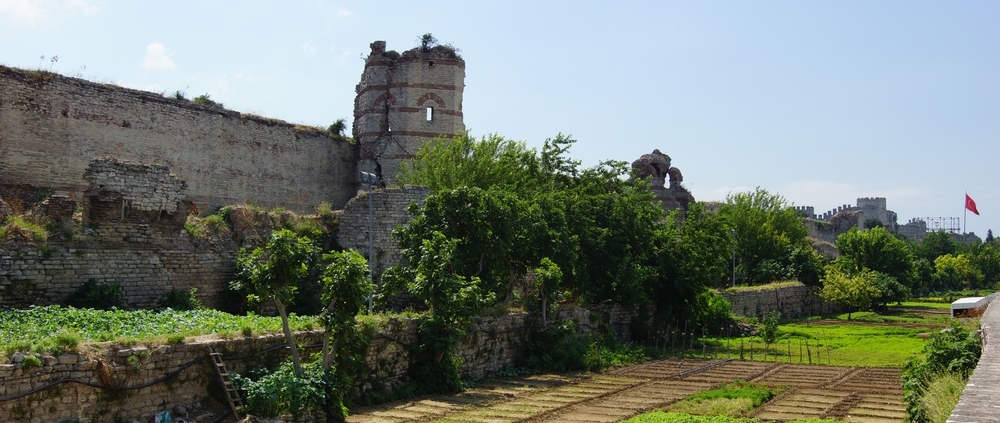What Do the “Sides” of Constantinople in This Hadith Mean?
Answered by Shaykh Abdullah Anik Misra
Question
Can you explain the hadith in Sahih Muslim, which states that the sides of Constantinople will fall when 70,000 Bani Ishaq say “La ilaha illa Allah” and “Allahu Akbar?” What is meant in the hadith by “sides?” Is it referring to the walls that were once in Constantinople during the time of the Prophet (Allah bless him and give him peace) but are no longer in use today and partly destroyed? Or does it mean something else linguistically?
If it is referring to the walls of Constantinople, how can one understand this hadith? Does it have to do with the fact that civilization will go back to a time of no technology where city walls will be useful again and that the walls of Constantinople will be rebuilt?
Answer
In the Name of Allah, Most Merciful and Compassionate
The hadith is as follows: the Prophet Muhammad (Allah bless him and give him peace) said,
“Have you heard of the city that has one side of it along the land and the other side of it along the (coast of the) sea?” They replied, “Yes, O Messenger of Allah!” He continued, “The Hour (Judgement Day) will not occur till 70,000 of the Sons of Isaac will besiege it.
When they arrive there, they will encamp around it, but they will not fight with any weapon nor launch any arrow. They will say, ‘There is no god but God!’ and ‘God is the Greatest!’, then one side of the city will fall.’ (One of the narrators of the hadith said: I don’t know this narration except with him saying, ‘(the side) that is along the sea.’)
Then, they will say a second time, ‘There is no god but God!’ and ‘God is the Greatest!’ and then the other side will fall. Then they will say a third time, ‘There is no god but God!’ and ‘God is the Greatest!’ and victory will be opened to them, and they will enter the city and seize its resources. While they will be dividing those resources, a crier will come to them announcing, ‘The Dajjal [Anti-Christ] has emerged!’ So they will leave everything and return.” [Muslim]
The Potential Meaning of the Hadith
It is important to note that the city’s name was not explicitly given in the hadiths. While many scholars identified it with Constantinople (modern-day Istanbul), Mulla Ali al-Qari says it could be another city since Constantinople was already conquered with much warfare, which the hadith says will not occur. [Qari, Mirqat al-Mafatih]
Of course, this doesn’t preclude that it could have to be conquered once again in the future (may Allah protect it) because the Companions’ response indicated that they readily understood which city was being described.
In Arabic, the “side” of the city is “janib,” which doesn’t necessarily mean a wall but rather one end of the city. Still, the fact that it will “fall” could indicate a wall, according to scholars, which was a common defense in old cities. This does not preclude another meaning that we do not yet know. [Ibid]
We do not know whether it will be that very city (Constantinople), let alone those ancient walls or something else that will fall at the ends of the city, nor which time period it will occur in, so it cannot be concluded as to what state the world will be in terms of technology. Yes, scholars can speculate and offer their deductions based on other pieces of information.
These hadiths about the end of times are sometimes open to interpretation by scholars because they portend future events that may not be perfectly understood until they pass. Still, their point is to heed the lessons they offer and benefit from what we know of what they are telling us and leave the details to the knowledge of Allah and the unfolding of time by His will.
Wassalam,
[Shaykh] Abdullah Anik Misra
Checked and Approved by Shaykh Abdul-Rahim Reasat
Shaykh Abdullah Anik Misra was born in Toronto, Canada, in 1983. His family hails from India, and he was raised in the Hindu tradition. He embraced Islam in 2001 while at the University of Toronto, from where he completed a Bachelor of Business Administration. He then traveled overseas in 2005 to study the Arabic language and Islamic sciences in Tarim, Yemen, for some time, as well as Darul Uloom in Trinidad, West Indies. He spent 12 years in Amman, Jordan, where he focused on Islamic Law, Theology, Hadith Sciences, Prophetic Biography, and Islamic Spirituality while also working at the Qasid Arabic Institute as Director of Programs. He holds a BA in Islamic Studies (Alimiyya, Darul Uloom) and authorization in the six authentic books of Hadith and is currently pursuing specialized training in issuing Islamic legal verdicts (ifta’). He holds a certificate in Counselling and often works with new Muslims and those struggling with religious OCD. He is an instructor and researcher in Sacred Law and Theology with the SeekersGuidance The Global Islamic Seminary. Currently, He resides in the Greater Toronto Area with his wife and children. His personal interests include Indian history, comparative religion, English singing, and poetry.
